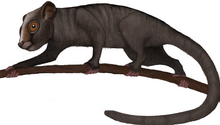Carpolestes
|
Carpolestes Temporal range: late Paleocene |
|
|---|---|
 |
|
| Carpolestes simpsoni | |
| Scientific classification | |
| Kingdom: | Animalia |
| Phylum: | Chordata |
| Class: | Mammalia |
| Order: | †Plesiadapiformes |
| Superfamily: | †Carpolestoidea |
| Family: | †Carpolestidae |
| Genus: |
†Carpolestes Simpson, 1928 |
| Type species | |
| †Carpolestes nigridens |
|
| Paleospecies | |
|
†C. dubius Jepsen, 1930 |
|
†C. dubius Jepsen, 1930
†C. nigridens Simpson, 1928
†C. simpsoni Bloch and Gingerich, 1998
Carpolestes is a genus of extinct primate-like mammals from the late Paleocene of North America. It first existed around 58 million years ago. The three species of Carpolestes appear to form a lineage, with the earliest occurring species, C. dubius, ancestral to the type species, C. nigridens, which, in turn, was ancestral to the most recently occurring species, C. simpsoni. It had flattened fingernails on its feet but with claws on its fingers. Morphologically it supports Robert Sussman´s theory of the co-evolution of tropical fruiting Angiosperms and early primates where Angiosperms provide nectar and fruits in return for dispersing the seed for tropical rainforest plans. It appears to have been a distant relative of the Plesiadapiforms such as Plesiadapis.
...
Wikipedia
